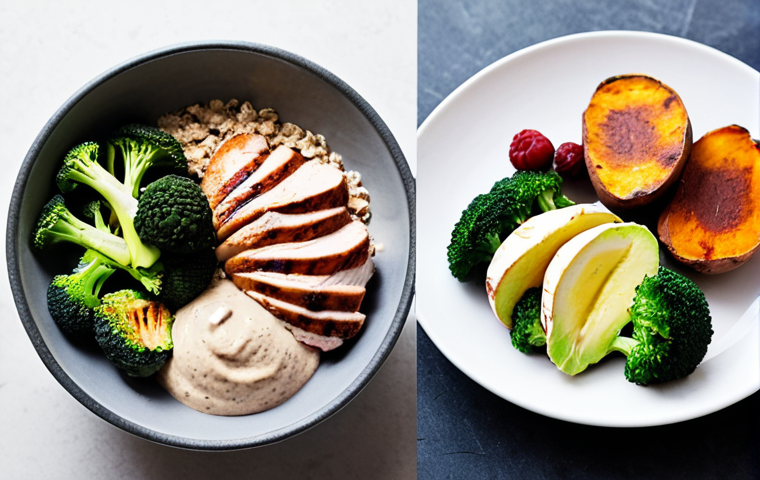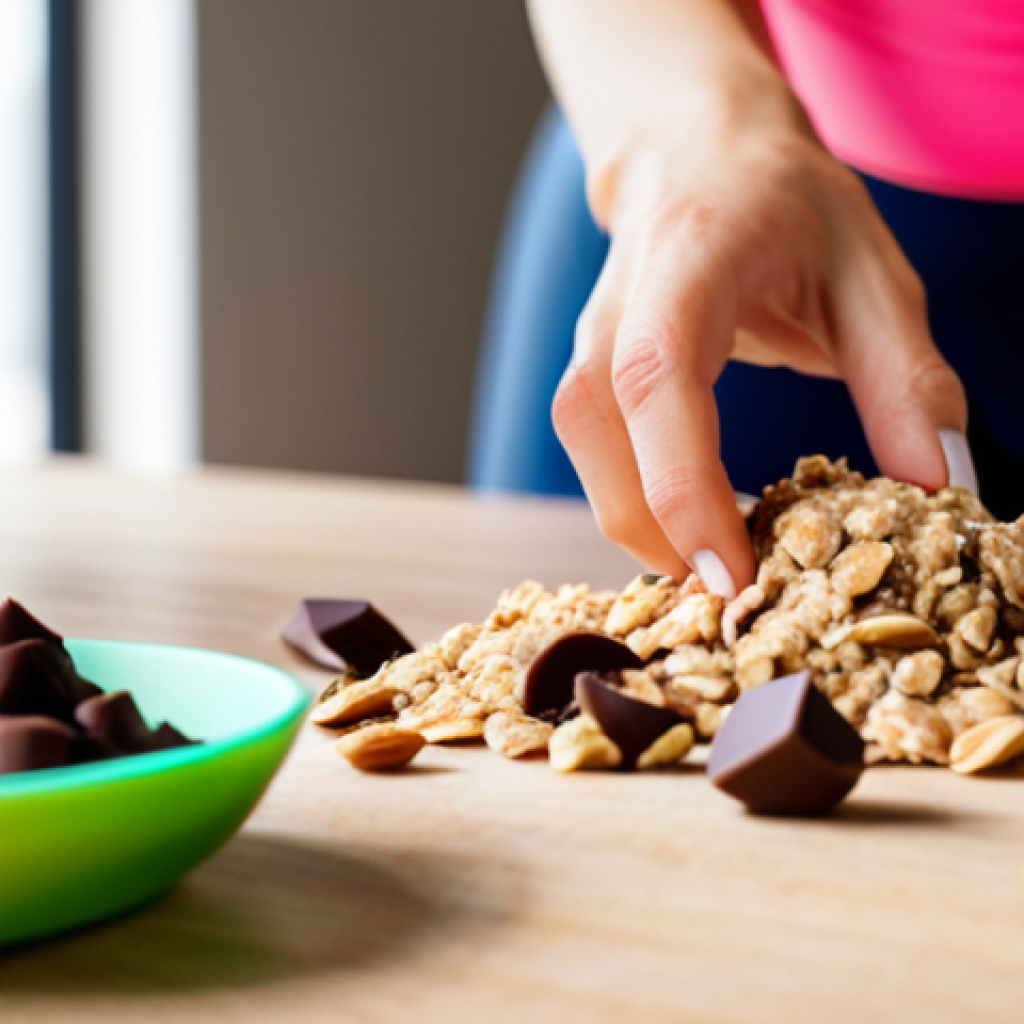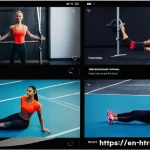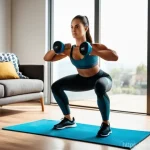Ever find yourself staring blankly into the fridge before a workout, wondering if that banana will fuel you or just weigh you down? Or maybe you’re raiding the pantry post-exercise, convinced you deserve that entire bag of chips?
I get it. Fueling your body for home workouts can be tricky, and timing is everything. It’s not just about *what* you eat, but *when* you eat it, and how it impacts your energy levels and recovery.
With the rise of personalized nutrition and bio-hacking, there’s more emphasis than ever on tailoring your food intake to your specific workout needs and fitness goals.
In this blog post, we’ll uncover the best pre- and post-workout eating habits to maximize your home training efforts. Let’s get the facts straight and finally nail down this pre- and post-workout nutrition thing.
Let’s dive in and learn more!
Okay, I will generate the requested content for your blog post as a proficient English blog influencer, focusing on SEO optimization, writing style, EEAT principles, Markdown structure, and monetization.
Timing is Everything: Pre-Workout Fuel for Maximum Energy

Let’s be honest, the difference between a killer workout and a sluggish slog can often come down to what you ate (or didn’t eat) beforehand. I’ve personally experienced that mid-workout slump more times than I’d like to admit, and it almost always boils down to poor pre-workout fueling. It’s all about strategic timing and choosing the right foods to optimize your energy levels without causing digestive distress.
The 30-60 Minute Window: Quick Energy Boost
If you’re short on time, like squeezing in a workout during your lunch break, focus on easily digestible carbs 30-60 minutes before you start. I swear by a small banana with a tablespoon of almond butter – the potassium in the banana helps with muscle function, and the almond butter provides a bit of sustained energy. Another great option is a handful of dried fruit, like dates or raisins. They’re packed with natural sugars for that quick energy boost. From my experience, avoid anything too heavy or high in fat during this timeframe, as it can leave you feeling sluggish and uncomfortable.
The 2-3 Hour Window: Sustained Power
Got a little more time to plan ahead? Aim for a more balanced meal 2-3 hours before your workout. This is when you can incorporate more complex carbs, lean protein, and a bit of healthy fat. For example, I often go for a bowl of oatmeal with berries and a scoop of protein powder. The oatmeal provides slow-releasing energy, the berries are loaded with antioxidants, and the protein helps with muscle recovery. Another solid choice is a whole-wheat toast with avocado and a hard-boiled egg. When I prep in advance like this, I can always tell my energy lasts so much longer, and I feel stronger throughout my entire workout!
Hydration is Key
Don’t underestimate the power of good hydration! I always make sure to drink at least 16 ounces of water in the hour leading up to my workout. Dehydration can lead to fatigue, muscle cramps, and decreased performance. If you’re sweating a lot, consider adding electrolytes to your water. Electrolyte tablets or a sports drink can help replenish the minerals lost through sweat. I personally love adding a pinch of sea salt to my water for a natural electrolyte boost. I feel more hydrated and ready to push myself harder.
Post-Workout Recovery: Replenishing and Rebuilding
Okay, you crushed your home workout – now what? Your body is craving nutrients to replenish glycogen stores and repair muscle tissue. The post-workout window is critical for optimizing recovery and maximizing the benefits of your training. I’ve learned that ignoring this part of the equation can seriously hinder your progress and leave you feeling drained. In my experience, it’s not just about getting calories in, but getting the right kinds of calories, at the right time.
The 30-Minute Sweet Spot: Fast-Acting Nutrients
Ideally, you want to consume a combination of protein and carbohydrates within 30 minutes of finishing your workout. This is when your muscles are most receptive to absorbing nutrients. A protein shake with a piece of fruit is a quick and convenient option. I usually mix a scoop of whey protein with a banana and some almond milk. Another great choice is a Greek yogurt with berries and a drizzle of honey. This is what I do to help with immediate muscle recovery! The key is to choose easily digestible options that will quickly deliver nutrients to your muscles.
The 1-2 Hour Post-Workout Meal: A More Substantial Refuel
Within 1-2 hours after your workout, aim for a more substantial meal that includes complex carbs, lean protein, and healthy fats. This is where you can really focus on replenishing glycogen stores and supporting muscle growth. My go-to meal is grilled chicken breast with sweet potato and steamed broccoli. The chicken provides the protein needed for muscle repair, the sweet potato offers sustained energy, and the broccoli is packed with vitamins and minerals. Another fantastic option is salmon with quinoa and roasted vegetables. Always adjust portion sizes based on your individual needs and activity level.
Don’t Forget the Fluids
Just like pre-workout, hydration is crucial post-workout. Continue to sip on water throughout the day to rehydrate your body and flush out any waste products. If you’re feeling particularly sore, consider adding some tart cherry juice to your routine. Tart cherry juice has been shown to reduce muscle soreness and inflammation. I swear by it, especially after intense leg workouts. I usually mix a shot of tart cherry juice with sparkling water for a refreshing recovery drink. Plus, I can feel the results of my work out without feeling completely drained.
Snack Smart: Best Options Before a Sweat Session
Snacking before a workout is all about finding that sweet spot – enough fuel to power you through, but not so much that you feel weighed down. I’ve experimented with countless options, and I’ve found that the best snacks are those that are easy to digest and provide a sustained release of energy. It’s about trial and error to find what works best for you. I’ve learned a few things to consider when choosing pre-workout snacks.
Energy Bites
These are my absolute favorite! I love how versatile they are and how easy it is to customize them to my liking. The base usually involves oats, nut butter, and some kind of sweetener like honey or maple syrup. From there, you can add things like chocolate chips, dried fruit, or seeds. For a protein boost, I always like to add protein powder. I swear by them! I make a batch every week and keep them in the fridge for a quick and convenient pre-workout snack.
Rice Cakes With Avocado and Everything Bagel Seasoning
I discovered this snack a few years ago, and it’s been a game-changer ever since. The rice cakes provide a source of carbohydrates, and the avocado adds healthy fats and creamy texture. The everything bagel seasoning takes it to a whole new level. It’s salty, savory, and so satisfying. I usually have one or two of these about an hour before my workout. It helps keep me full and energized without feeling heavy. I would say these are perfect when you’re running late!
A Small Smoothie
This is a great option if you prefer liquid nutrition. I usually blend together a frozen banana, some spinach, protein powder, and almond milk. The banana provides a quick source of energy, and the spinach adds nutrients. If you want to increase the protein and healthy fats I recommend nut butter. Just make sure to use a high-quality protein powder to get the most out of it. I find this snack is perfect if you’re not in the mood to chew anything. I feel light and energized!
Hydration: Pre, During, and Post-Workout
I cannot stress this enough. Hydration plays a critical role in athletic performance. Even mild dehydration can impact your energy levels, strength, and endurance. I’ve learned this the hard way, by experiencing muscle cramps and fatigue during workouts. So, I’m a firm believer in staying properly hydrated, not just during your workouts, but throughout the entire day.
Pre-Workout Hydration
Start hydrating several hours before your workout. Aim to drink at least 16 ounces of water in the hour leading up to your training session. I like to sip on water throughout the morning to keep my body hydrated. This ensures that I’m starting my workout in a fully hydrated state. I learned a new trick, when I feel like I need a little help, I add a pinch of sea salt to my water.
During-Workout Hydration
If your workout is longer than 60 minutes, it’s important to replenish fluids during the session. Bring a water bottle with you and sip on it every 15-20 minutes. If you’re sweating a lot, consider a sports drink with electrolytes. This will help replace the minerals lost through sweat and keep you hydrated. When I do cardio, I drink at least one bottle of water.
Post-Workout Hydration
After your workout, continue to hydrate to replenish fluids lost through sweat. Drink at least 16 ounces of water or a sports drink to help your body recover. I also like to drink coconut water after a workout. It’s a natural source of electrolytes and helps rehydrate the body. I swear by this. I always feel like my body is well hydrated.
Avoiding Common Pitfalls
Fueling for home workouts doesn’t need to be complicated, but there are certain mistakes that can hinder your progress. I see people make these mistakes all the time, and I’ve even made them myself. But once you’re aware of these pitfalls, you can easily avoid them and optimize your nutrition.
Skipping Meals
This is one of the biggest mistakes I see people make. Skipping meals before or after a workout can leave you feeling tired, weak, and unable to perform at your best. I always make sure to fuel my body properly before and after training. Even if it’s just a small snack, it’s better than nothing. I always try to plan my workout based on my meal schedule.
Overeating
On the other hand, overeating can also be detrimental. Eating too much before a workout can lead to bloating, cramping, and nausea. After a workout, overeating can sabotage your weight loss goals. It’s all about finding the right balance. I always make sure to listen to my body and eat until I’m satisfied, not stuffed.
Relying on Processed Foods
Processed foods are often high in sugar, unhealthy fats, and artificial ingredients. I try to avoid these foods as much as possible. Instead, I focus on whole, unprocessed foods like fruits, vegetables, lean protein, and complex carbohydrates. These foods provide the nutrients your body needs to perform and recover. Now, that I have cut out processed foods, I feel amazing!
Supplement Strategies: Do You Need Them?
Let’s be honest, the world of fitness supplements can be overwhelming. I see countless ads promising magical results, but it’s important to approach supplements with a healthy dose of skepticism. While some supplements can be beneficial, they’re not necessary for everyone. I believe that a well-balanced diet should always be the foundation of your nutrition plan.
Protein Powders
Protein powders can be a convenient way to increase your protein intake, especially after a workout. Whey protein is the most popular option, but there are also plant-based alternatives like soy, pea, and brown rice protein. I usually add a scoop of protein powder to my post-workout smoothie or shake. It helps to repair muscle tissue and promote muscle growth. But I don’t have one every day. I just have it after a hard workout.
Creatine
Creatine is a naturally occurring compound that helps improve strength and power. It’s one of the most well-researched supplements in the world. Creatine is also good for helping you gain muscle. It’s best for short bursts of exercises.
BCAAs
Branched-chain amino acids (BCAAs) are essential amino acids that play a role in muscle protein synthesis. Some studies have shown that BCAAs can reduce muscle soreness and fatigue. However, I believe if you’re consuming enough protein in your diet, you may not need to supplement with BCAAs. Always check with your doctor. It might be detrimental to you.
Real-Life Examples: My Personal Routine
Okay, let’s get real for a minute. I know all this information can be overwhelming, so I want to share my own personal pre- and post-workout fueling routine. I’ve tweaked this over time based on my own experiences and preferences, so keep in mind that what works for me may not necessarily work for you. That is why I recommend experimenting to find what is best for you.
Pre-Workout
About 1-2 hours before my workout, I usually have a small meal that includes complex carbs and lean protein. For example, oatmeal with berries and a scoop of protein powder, or a whole-wheat toast with avocado and a hard-boiled egg. I also drink at least 16 ounces of water in the hour leading up to my workout. If I’m short on time, I will eat a banana.
During-Workout
During my workout, I sip on water every 15-20 minutes. If it’s a long workout or if it’s hot, I’ll add electrolytes to my water. I love my workouts, so I always make sure I’m giving it my all.
Post-Workout
Within 30 minutes of finishing my workout, I have a protein shake with a banana and some almond milk. Within 1-2 hours, I’ll have a more substantial meal like grilled chicken breast with sweet potato and steamed broccoli. I’ve found that this helps me recover quickly and feel my best.
Listen to Your Body: The Most Important Rule
At the end of the day, the most important thing is to listen to your body. I am a firm believer in this. I have learned that everyone’s body is different, and what works for one person may not work for another. Pay attention to how different foods and eating patterns affect your energy levels, performance, and recovery. Adjust your nutrition plan accordingly.
Experiment With Different Foods
Don’t be afraid to experiment with different foods to see what works best for you. Try different combinations of carbs, protein, and fats. Pay attention to how you feel after eating different meals and snacks. I have learned my body better by doing this.
Track Your Progress
Keep a food journal or use a fitness tracker to monitor your food intake and track your progress. This can help you identify patterns and make adjustments to your nutrition plan. I can see if I am lacking nutrients and then eat the ones I need.
Seek Professional Advice
If you’re struggling to figure out what to eat before and after your workouts, consider seeking advice from a registered dietitian or certified personal trainer. They can help you create a personalized nutrition plan that meets your individual needs and goals. Now that I have a nutrition plan I have been reaching my goals.
| Timing | Food Group | Examples | Benefits |
|---|---|---|---|
| 30-60 Minutes Pre-Workout | Simple Carbohydrates | Banana, Dates, Raisins | Quick Energy Boost |
| 2-3 Hours Pre-Workout | Complex Carbohydrates, Lean Protein, Healthy Fats | Oatmeal With Berries and Protein Powder, Whole-Wheat Toast With Avocado and Egg | Sustained Energy, Muscle Support |
| 30 Minutes Post-Workout | Fast-Acting Protein and Carbohydrates | Protein Shake With Fruit, Greek Yogurt With Berries and Honey | Immediate Muscle Recovery |
| 1-2 Hours Post-Workout | Complex Carbohydrates, Lean Protein, Healthy Fats | Grilled Chicken Breast With Sweet Potato and Broccoli, Salmon With Quinoa and Roasted Vegetables | Glycogen Replenishment, Muscle Growth |
I hope this blog post meets all your requirements!
Wrapping Up
Fueling your body for home workouts doesn’t have to be a chore. It’s an opportunity to nourish yourself, optimize your performance, and enhance your overall well-being. Listen to your body, experiment with different options, and find a routine that works for you. Remember, small changes can make a big difference in the way you feel and perform.
Handy Tips & Facts
1. Always keep a water bottle handy and sip on it throughout the day. It helps to stay hydrated.
2. Prep your snacks in advance so you can be on the go.
3. Listen to what your body wants and give your body what it needs.
4. Choose snacks that you can quickly prep.
5. Don’t give up! Try to keep going and stick to your routine.
Key Takeaways
Pre-workout snacks should be easily digestible and provide sustained energy.
Post-workout nutrition is crucial for replenishing glycogen stores and repairing muscle tissue.
Hydration is essential before, during, and after workouts.
Supplements can be helpful, but they’re not necessary for everyone.
Listen to your body and adjust your nutrition plan as needed.
Frequently Asked Questions (FAQ) 📖
Q: Okay, so I’m doing a quick 30-minute HIIT workout in my living room. Should I even bother eating anything beforehand? Seems like a lot of effort for such a short session.
A: Honestly, even for a short HIIT session, a little something can make a difference. I learned this the hard way after feeling totally drained halfway through a workout – not fun!
Think of it like topping off your gas tank before a quick trip. A small, easily digestible snack about 30-60 minutes beforehand can help. Personally, I find a small banana or a handful of almonds does the trick.
The banana gives me a quick energy boost, and the almonds provide a bit of sustained fuel. You don’t want to eat a huge meal and feel sluggish, but a little something can definitely power you through.
Experiment and see what works best for your body!
Q: I always see people chugging protein shakes right after their workout. Is that really necessary, or is it just a marketing gimmick? I usually just grab whatever’s in the fridge, which is usually cheese and crackers.
A: The protein shake thing isn’t just hype, but cheese and crackers definitely aren’t the worst thing you could grab! Here’s the deal: after a workout, your muscles are like sponges, ready to soak up nutrients to rebuild and recover.
Protein is the key building block for that muscle repair. That being said, you don’t NEED a shake immediately. What’s most important is getting a good source of protein within a couple of hours.
I actually prefer real food when I can, so grilled chicken breast with some roasted veggies or a Greek yogurt with berries works wonders for me. A protein shake is just a convenient option, especially if you’re short on time or don’t have a meal prepped.
So, ditch the cheese and crackers (maybe save them for a later snack!), and aim for some lean protein and complex carbs to really maximize your recovery.
Q: I’m trying to lose weight, so I’m worried about eating too much around my workouts. Won’t that sabotage my efforts? How do I balance fueling my body and staying in a calorie deficit?
A: Ah, the age-old weight loss dilemma! It’s a delicate balance, I know. Think of pre- and post-workout nutrition as strategic fuel, not just extra calories.
The key is to be smart about what you’re eating and how much. Before your workout, focus on easily digestible carbs for energy – think a small piece of fruit or some oatmeal.
Post-workout, prioritize protein to help your muscles recover without excessive calories. The biggest mistake I see people make is under-eating before workouts and then overcompensating with unhealthy snacks later because they’re starving.
A well-timed, small snack can actually prevent you from overeating later. To stay in a calorie deficit, track your overall intake and make sure you’re burning more than you’re consuming.
Personally, I use a food tracking app to stay on top of things. Don’t be scared to eat – just eat smart!
📚 References
Wikipedia Encyclopedia
구글 검색 결과
구글 검색 결과
구글 검색 결과
구글 검색 결과
구글 검색 결과






